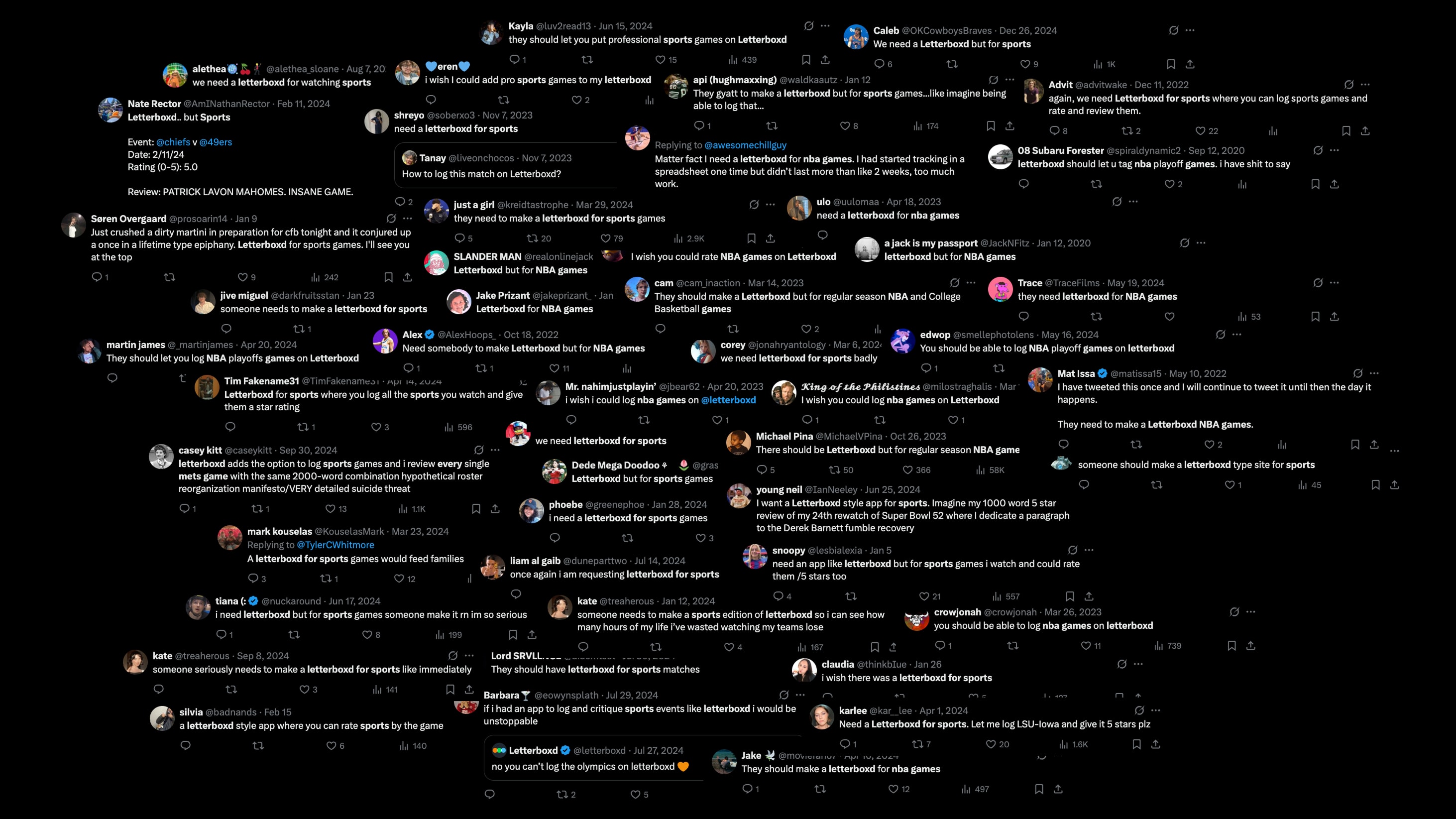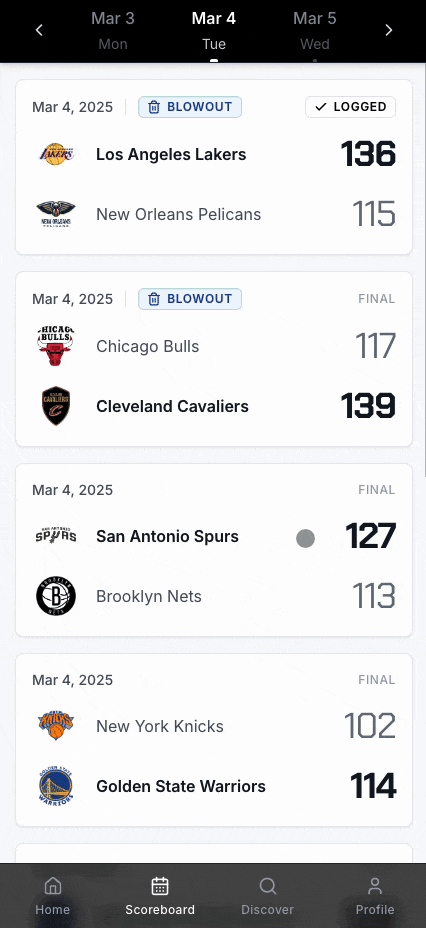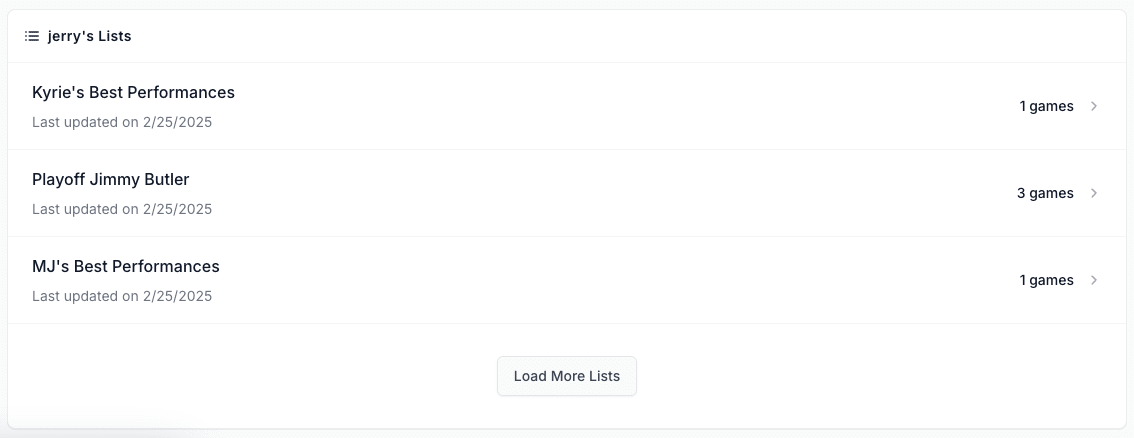Published on March 12, 2025 9:46 PM GMT
It started as a spreadsheet, then I built a simple website to make it easier. It's like Letterboxd/Goodreads but for NBA games - find any game since the 1984-85 season, give it a letter grade, add notes, and create lists.
It's 100% free, no ads, and I don't collect any personal info - I originally made it for myself and a few friends, but we've all found it useful so I thought maybe others would like it too. It's been fascinating to see patterns in what I enjoy (and how much time I spend watching games that bring me the opposite of joy).
I also wrote this essay explaining why I did this:
The Log
Years ago, I visited a friend in Manhattan. One evening, as we talked about movies on his parents' couch, his father turned to his computer when we mentioned a certain film.
"Let me check if I've seen it," he said. I watched as he opened a document and scrolled through what seemed like endless text.
"This is every movie I've ever watched," he explained.
When I asked why he kept it, he told me that at first, it was simply to remember what he'd seen. "Then I noticed patterns in what I enjoyed. Now, it's my film log."
That moment has stayed with me ever since—a quiet archive of a lifetime of movies, emotions, and shifting perspectives, created not for others, but for personal reflection. There was something so simple, yet profound about it.
medium lights
In 2020, I started a basketball newsletter called medium lights. No grand vision—just a way to document my relationship with the game. I wrote about niche moments that moved me, plays that revealed the game's hidden geometry, and players evolving before my eyes.
Basketball has been with me since childhood. My earliest memories are of early 2000s NBA games. By my mid-twenties, I'd watched thousands of matchups—an almost embarrassing number of hours spent watching people put a ball through a hoop.
I have a pretty good memory, but even still, most games blur together. medium lights became my attempt to preserve them. I wrote in lowercase, rarely hitting backspace except for obvious typos. I wanted the rawness of my genuine reactions.
What surprised me was how it resonated with others. After sharing a post on Reddit, nearly a thousand people subscribed in the first week. Many wrote saying they'd been searching for this kind of perspective amid the highlight reels and hot takes flooding sports media.
But newsletters have limits. They're chronological—older entries get buried, patterns disappear. When my life got busy, medium lights went dormant.
The core idea never left me, though. I've always wanted a space to document my journey with basketball—a log of a lifetime spent with the game.
The Gap in the Market
Most activities that fill our entertainment hours have dedicated platforms for personal documentation and discovery.
Letterboxd for films. Goodreads for books. Yelp for food. Countless apps for music and travel.
Yet sports lacks an equivalent. I remember finding Letterboxd and thinking, "Why doesn't this exist for basketball?"
Turns out I'm not alone. A quick search for "Letterboxd for sports/NBA games" reveals years of people asking for exactly this. For some reason, nobody has built it.

So a few weeks ago, I sat down and began coding. Hooplog was born.
Hooplog
I built Hooplog with one focus: to create the platform I desperately want to use. This clarity drove every decision about its features, design, and experience.
Using Hooplog is simple. Clicking any game card instantly opens a grading interface. Select a grade, optionally add notes, save. No page navigation. No loading screens.

Most review platforms use a 5-star rating system with half-star increments. I chose an A–F letter grade system instead because it simplifies decisions. There's a more intuitive difference between grading something a B or C than deciding between 3.5 or 4 stars.
Plus, it makes your contribution graph more visual—showing not just when you watched games, but how much you enjoyed them. I've always found GitHub's contribution graph visually striking—a map of consistency over time. Adapting this for basketball created a powerful way to see your fandom evolve, day by day.

Another inspiration was Spotify Wrapped. People share their listening stats not just to showcase their taste, but because they're fascinated by insights about themselves—discoveries about habits they weren't consciously aware of.
I've always wondered:
- How many games have I watched in my entire life?How many hours does that represent?What level of enjoyment did I experience with each game?How have my viewing patterns changed over time?Which team have I watched the most?

As I used Hooplog, I realized it also needed a way to organize games. With thousands of NBA matchups every year, I naturally categorize them in my head. Lists provide a way to curate these collections for personal reference.

Some of the most important decisions weren't about what to include, but what to leave out. I purposefully excluded:
- Comments or discussionsVoting on individual gradesSharing mechanisms for single reviewsFollower/following systemsSocial activity feeds
Comments and discussions were the most obvious omission. It's not that I don't value basketball conversation—I do—but excellent spaces for that already exist. I don't want to replace what's already great.
I also didn't include traditional social features like follows and activity feeds. These elements create pressure to perform for an audience rather than document honestly for yourself. That shift—from introspection to presentation—changes the experience entirely.
Finally, I designed Hooplog in light mode. Not because I dislike dark mode, but because it forced me to design well without relying on heavy contrasts, glowing effects, or visual tricks. Light mode makes Hooplog feel more like a documentation tool than a social platform. It gives the app a sense of sophistication that aligns with its purpose: a reflection tool rather than a content feed.
The Vision
As I write this in March 2025, Hooplog is still in its infancy. But the vision remains clear.
Basketball, at its best, is more than entertainment—it's a window into human excellence, competition, teamwork, and growth. The games we watch become chapters in our own stories.
Whether Hooplog grows into a real community or remains just for me, I hope its purpose stays the same: To honor our time with the game we love, preserve what might otherwise fade, and transform watching into an act of reflection.
If you made it this far, I'd love to hear your thoughts on Hooplog and genuine feedback on how to make it better!
Discuss

